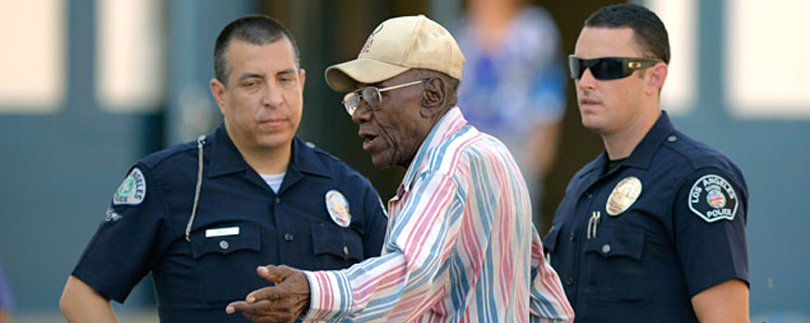Police present an intimidating front. From the moment you’ve been pulled over in your car, approached in public, or even confronted by police at your own doorstep, police continuously convey the idea that you’ve done something wrong, putting you on the defensive. And although police perform an important function of preserving order in our relatively peaceful society, if you come under their microscope, the best thing you can do is convey as little information as possible while politely respecting their control over you. Here’s why:
What Police Hope to Accomplish when They Talk to You
Police enforce the law. That’s their job. In fact, another name for police is “law enforcement officers.” Unlike judges, they have no role to play in deciding guilt or innocence. In their interactions with people, they are looking for ways to bring criminal charges—that’s it. And despite official police policy to the contrary, they are praised for more aggressive tactics, resulting in more numerous charges.
Why is it important to understand this—the role of policing, from the police’s own perspective? Many people believe the police are “on their side,” and will vindicate their interests related to another party who has wronged them. All too often, however, the police end up charging the very person who looked to them for help. The question ever on a police officer’s mind is, “how can I bring criminal charges?” Remembering this crucial fact can guide your interactions with police in a way that protects your rights, and decreases the chance you will be charged with a crime.
Why Do Police Ask Me Difficult Questions?
Most people would describe police questioning as a stressful interrogation. Police create this feeling intentionally, so you will open the door to give them more avenues to charge you with a crime. One way police do this is to ask for your consent. You may have heard lawyers say “never consent to a search.” The reason isn’t because you have anything to hide; it’s because you have nothing to gain and everything to lose. If police ask to search your person, your vehicle, or your home, they are asking for your consent, a legal requirement for them to introduce any evidence they find before a court. If they didn’t need your consent, they wouldn’t ask for it: they would just start searching straight away. Thus, whenever a police officer asks to search, your best course of action is to respectfully decline.
A second police question is even more straightforward: they ask you to confess to a crime directly. Have you ever been asked “do you know why I pulled you over?” Or how about “do you know why I’ve been called to your residence?” Police phrase open-ended questions this way to get you talking in a way that will get you to confess to breaking the law. An obvious point bears stating directly: never confess to breaking the law. It is never in your best interest to confess wrongdoing to police. If you do, they have everything they need to charge you with a crime. Even if police say “tell me the truth and this will go easier for you,” never admit anything. Instead, very politely phrase your answer in a way that is truthful, but admits no wrongdoing. For example, say “I always try to obey the law.”
Respecting Police Authority = De-escalation
Nothing makes a police officer get hot more quickly than disrespecting him. Police work attracts people who enjoy lording authority over other people. Using disrespectful language or tone is a sure way to escalate a police encounter, and make them go out of their way to nail you. Instead, even if you feel you have done nothing wrong, the most practical approach is to be extremely respectful, polite, and deferential to police. If you do, you will leave the impression in their minds that you are a good citizen rather than a brazen law breaker. Do you have the right to disrespect police? Strictly speaking, yes. Is it in your best interest in avoiding being charged with crimes? No.
A Skillful and Experienced Advocate
Sometimes you can’t avoid being charged with a crime. Everyone makes mistakes, or has an unlucky break every once in a while. If you have been charged, do not try to talk your way out of it with police, detectives, and judges. Ninety-nine times out of a hundred, you will end up admitting to some wrongdoing that will be the basis of a criminal charge or conviction against you. Instead, hire an advocate to speak for you, helping you navigate the many potential pitfalls of the legal system. Unlike police, our sole goal at the Law Office of Walker Fults is to represent your best interests. Call us today at (214) 838-0557 to learn how we can help you.



